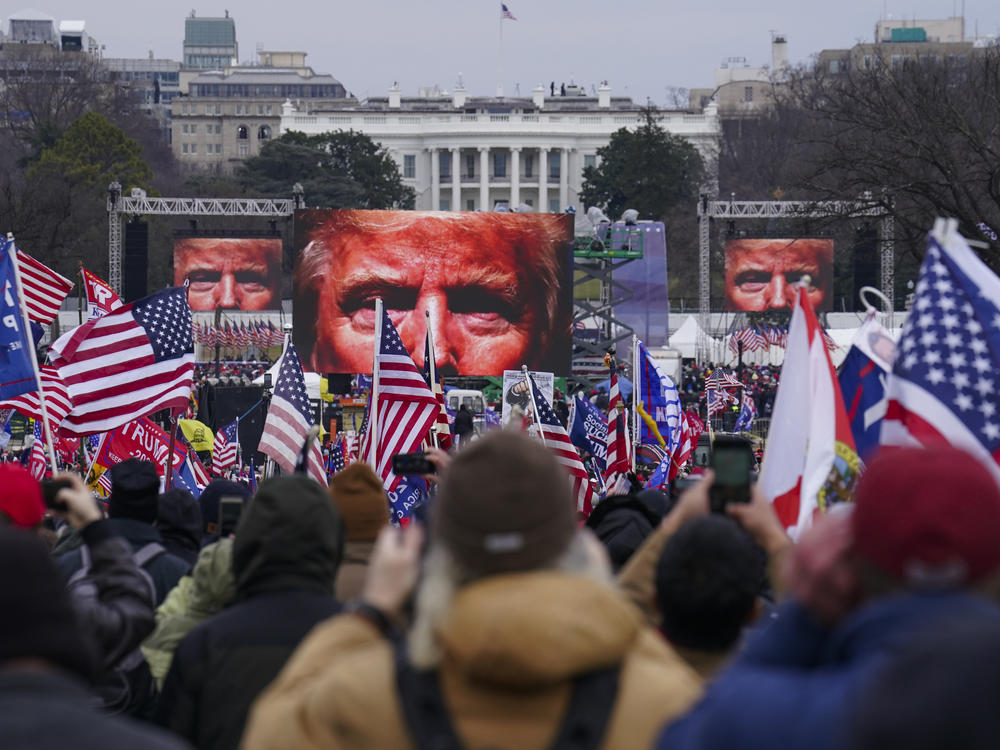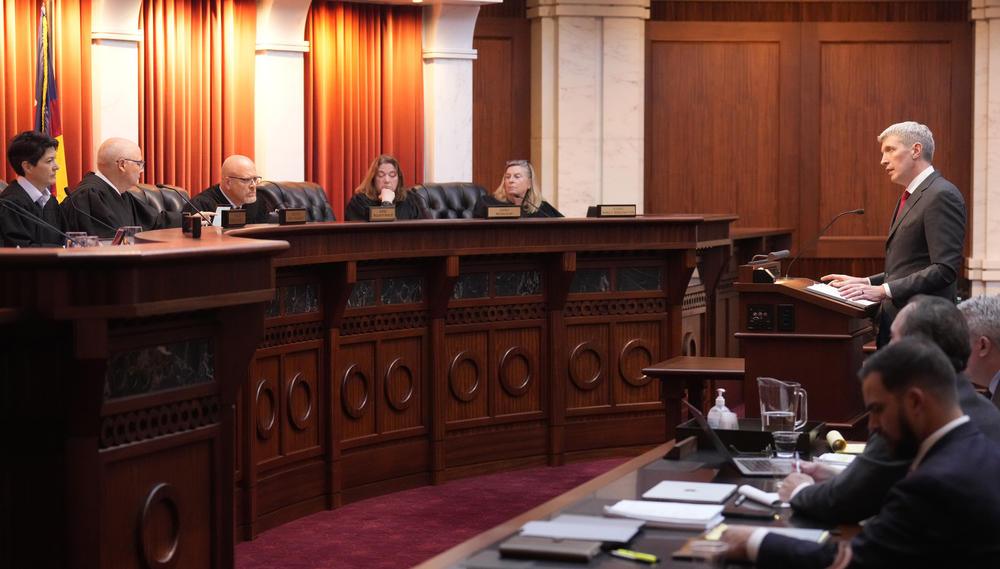Section Branding
Header Content
Colorado's Supreme Court disqualified Trump from the state ballot. What happens now?
Primary Content
Updated December 20, 2023 at 6:09 PM ET
Legal scholars and activists — mostly on the left — have argued for months that a Civil War-era constitutional clause should disqualify former President Donald Trump, the current Republican frontrunner, from holding office again.
They contend that Trump's words and actions on and around the Jan. 6 U.S. Capitol attack violate Section 3 of the 14th Amendment, which bars from office anyone who "engaged in insurrection or rebellion" against the United States. And liberal-leaning groups have brought that argument to court in many states.
Colorado became the first to agree on Tuesday, when its Supreme Court ruled that Trump is disqualified from appearing on its state primary ballot.
"Because he is disqualified, it would be a wrongful act under the Election Code for the Secretary to list him as a candidate on the presidential primary ballot," reads the 213-page opinion.
The landmark 4-3 ruling — which overturns a district court decision from last month — is the first time a high court in any state has found that Section 3 applies to both Trump's conduct and the office of the presidency itself.
The justices — all appointed by Democratic governors in the increasingly blue state — acknowledge that this amounts to "uncharted territory."
And "to maintain the status quo," they stayed their ruling until Jan. 4, the day before the secretary of state's deadline to certify primary ballots (Colorado's presidential primary will be held on March 5). That means that if the U.S. Supreme Court agrees to hear the case and is still in process by that date, Trump's name should be included on the ballot after all.
Trump campaign spokesperson Steven Cheung called the decision "completely flawed" and pledged to "swiftly file an appeal to the United States Supreme Court and a concurrent request for a stay of this deeply undemocratic decision."
For his part, President Biden said Wednesday that Trump "certainly supported an insurrection, but added: "Now whether the 14th Amendment applies, I'll let the court make that decision."
So what could happen next, in Colorado and beyond?
Justin Levitt, a constitutional law professor at Loyola Law School, told NPR that as long as there's a petition for U.S. Supreme Court review in place by Jan. 5, there's a "99.9%" chance that Trump will remain on the Colorado primary ballot.
And if Trump — with his consistently steady lead in GOP polls — does win the primary, Levitt expects there will be a similar legal effort to keep him off the general election ballot for the same reason.
"All of this is extremely important for a couple months down the road where we're going to get to have this fight again," he adds. "But the immediate impact is very unlikely to be determinative in the primary."
Republicans threaten to withdraw from the Colorado primary
Prominent Republicans — including Trump's rivals for the presidential nomination — are lining up to slam the Colorado court's decision and are already promising to take action against it.
Ronna McDaniel, chair of the Republican National Committee, wrote online that "our legal team looks forward to helping fight for a victory," referring to Trump's expected appeal.
Just hours after the ruling Tuesday, Trump's team sent an email with the subject line "REMOVED FROM THE BALLOT," urging supporters to give to his campaign. This is not the first such ask related to the Colorado case from Trump, who has been known to fundraise off his legal woes — and whose political persona is driven by a narrative of being persecuted by enemies.
The Colorado Republican Party similarly launched an online campaign urging donors to "help us keep Trump on the ballot and fight this election interference."
Colorado Republicans also threatened to withdraw from the primary and convert to a party-run caucus system if the ruling stands.
"We're not gonna take this lying down, and if need be we're going to withdraw from the primary and go to a strict caucus process that would allow our voters to choose Donald Trump if they want," state Rep. Dave Williams, the staunchly conservative chair of the Colorado Republican Party, told CNN on Tuesday.
That may be easier said than done, however, since the RNC has already approved the state party's nomination plan, ABC News reports. Williams told Colorado Public Radio that Republicans would seek a waiver, but the Democratic secretary of state responded that they can't legally switch to a caucus for their presidential selection.
Even some of Trump's GOP challengers are siding with him in this case.
Vivek Ramaswamy pledged in a statement and video to withdraw from the Colorado GOP primary ballot "until Trump is also allowed to be on the ballot."
New Jersey Gov. Chris Christie, who's campaigned to stop Trump from returning to office, criticized the court's ruling shortly after it came out. Speaking at an event in New Hampshire, he said Trump shouldn't be prevented from being president by any court, but rather by the country's voters.
What Colorado's decision could mean for the country
Legal experts and election officials have long predicted the Trump 14th Amendment challenges would end up in front of the U.S. Supreme Court, to be decided for the country as a whole rather than on a state-by-state basis.
Courts have ruled against similar efforts in Arizona, Minnesota and Michigan, though other legal battles are still pending — or have yet to be introduced — in other states.
Levitt, of Loyola, said Colorado's decision won't directly impact any of these other cases.
The "thoughtful" opinion gives other courts something to look at, to see if they agree or disagree, he noted. But he said the incentives remain basically the same for Trump's team to slow the process down and for the other side to speed things up.
"It punts this a few months down the road but doesn't actually stop the clock on any of the other proceedings," he explained.
And while the Supreme Court has a conservative supermajority, including three justices appointed by Trump himself, it's not clear how it would rule on the Colorado appeal.
Kim Wehle, a professor at the University of Baltimore School of Law, told Morning Edition that she believes the Supreme Court would take this case seriously because of the massive implications it holds not just for 2024 but for future elections.
"I think there should be an incentive along the way to say to would-be presidents, 'Listen, don't do what happened on Jan. 6, there'll be consequences for it,'" she added. "But we're in a politicized world and we have, arguably, a politicized Supreme Court."
Experts say it could choose to send the case back to the state level, or avoid ruling on the merits in some other way (like focusing on the wording of the clause, as the lower court in Colorado did).
This is not the only consequential case regarding Trump at the Supreme Court. The federal special counsel has asked the justices to quickly decide whether the former president enjoyed broad immunity from criminal charges as a result of his office.
When considering the 14th Amendment, Levitt says the tough question is not whether Trump is qualified to hold office, but who gets to make that call. He believes the courts will want to leave it up to voters, and says he's a little skeptical that "the law is going to decide this issue before the people do."
"There are a lot of questions that, if we get to November and the American people decide they don't want him as their chief executive, that the courts never have to decide," he adds.
NPR's Vanessa Romo contributed reporting.
Copyright 2023 NPR. To see more, visit https://www.npr.org.


